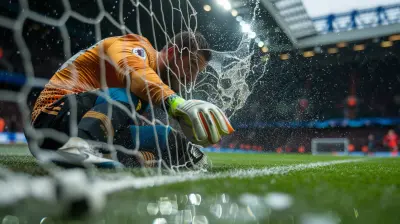2 December 2024
In sports, success doesn’t just happen by accident. Talented athletes, advanced training methods, and cutting-edge equipment can only take a team so far. What separates the good teams from the great ones is something far more intangible but equally vital: a winning culture. And here’s where things get really interesting—creating that winning culture isn’t just about motivational speeches or team bonding exercises. It’s about something far more strategic: tactical discipline.
Tactical discipline might sound like a dry, technical term at first glance, but it’s the glue that holds a successful team together. It’s the secret sauce that makes winners out of competitors. So, in this article, we're diving deep into how you can create a winning culture through tactical discipline, whether you’re a coach, a player, or even just a fan eager to understand what makes great teams tick.

What is Tactical Discipline?
Before we get into the nitty-gritty, let's clear up what we mean by "tactical discipline." Simply put, tactical discipline refers to a team’s ability to stick to a game plan, execute strategies with precision, and maintain focus under pressure. It’s about more than just following rules; it’s about understanding why those rules exist and committing to them, even when the going gets tough.Think about it like this: imagine you’re trying to cook the perfect dish. You have all the ingredients in front of you, but if you don’t follow the recipe, you might end up with a mess instead of a masterpiece. Tactical discipline is like sticking to the recipe when the heat is on—literally and figuratively.
The Difference Between Strategy and Tactics
While we're on the subject, let's break down the difference between strategy and tactics. Strategy is the big picture—your overall game plan or approach to winning. Tactics, on the other hand, are the specific actions or maneuvers you use to execute that strategy.For example, in football, your strategy might be to play aggressively and dominate possession. The tactics would be the specific formations, passing techniques, and defensive schemes that help you achieve that.
Tactical discipline, then, is the commitment to executing those tactics consistently and effectively, even when things don’t go perfectly according to plan.

Why Tactical Discipline is Crucial for Success
If you look at championship teams across all sports, there’s one common thread you'll find: a relentless commitment to tactical discipline. Whether it’s the New England Patriots in football or the Golden State Warriors in basketball, these teams don’t just rely on raw talent. They rely on their ability to execute their game plan with precision, no matter the circumstances. It’s not always flashy, but it’s incredibly effective.Consistency Over Flashiness
Here’s the deal: flashiness might win you a few games, but consistency wins championships. And consistency comes from tactical discipline. When players know their roles, understand the game plan, and execute it without deviation, you build a foundation of trust and reliability.Think about a basketball team. You might have a star player who can drop 40 points on any given night. But if that player is constantly taking bad shots or ignoring the team's overall strategy, their individual brilliance can actually hurt the team. On the other hand, a team that follows a disciplined approach, moving the ball, setting screens, and sticking to their defensive assignments, will often come out on top—even if they don’t have the most talented player on the court.
Pressure Situations
Tactical discipline becomes even more crucial in high-pressure situations. When the game is on the line and emotions are running high, it’s easy to panic and abandon the game plan. But winning teams stay cool under pressure. They trust their tactics and continue to execute the plan, even when things aren’t going their way.Ever watch a soccer team that’s down a goal late in the game? The undisciplined teams will start launching wild shots from 40 yards out, hoping for a miracle. The disciplined teams? They keep working the ball, looking for the right opportunity, and sticking to their tactics. More often than not, it’s the disciplined team that finds the equalizer.

Building a Winning Culture Through Tactical Discipline
Now that we’ve established the importance of tactical discipline, let’s talk about how you can actually build it into your team’s culture. This isn’t something that happens overnight, and it certainly isn’t something you can force. It requires a combination of leadership, communication, and buy-in from everyone involved.1. Establish Clear Expectations
The first step in building tactical discipline is setting clear expectations. Players need to understand what’s expected of them, both individually and as a team. This includes everything from knowing their specific roles to understanding the overall game plan.As a coach or leader, it's your job to communicate these expectations in a way that resonates with your players. Don’t just tell them what to do—explain why it’s important. Help them see how their individual actions contribute to the team’s success.
2. Create a System of Accountability
Once expectations are set, there needs to be a system of accountability in place. This doesn’t mean punishing players for making mistakes—in fact, that’s counterproductive. Instead, it’s about holding each other accountable for sticking to the game plan.When players know they’ll be held accountable, they’re more likely to stay focused and disciplined. This doesn’t just apply during games, either. Tactical discipline should be ingrained in everything from training sessions to team meetings. If players are slacking off during practice, chances are they’ll slack off during games too.
3. Cultivate Leadership
Great teams always have strong leadership, both on and off the field. While the coach plays a key role in establishing tactical discipline, it’s often the players themselves who enforce it. This is where team captains and veteran players can make a huge difference.Leaders on the team need to embody tactical discipline in everything they do. They set the tone for everyone else, whether that’s by sticking to defensive assignments or making the extra pass when the game is on the line. When younger or less experienced players see this kind of leadership, they’re more likely to follow suit.
4. Emphasize Mental Toughness
Tactical discipline isn’t just about physical execution—it’s about mental toughness, too. Players need to be able to stay focused, even when things aren’t going their way. Whether it’s dealing with a bad call from the referee or overcoming a string of mistakes, the ability to stay mentally disciplined is crucial.As a coach or leader, you can help your players develop this mental toughness by putting them in challenging situations during practice. Create drills that force them to stay focused under pressure or when they’re fatigued. The more they experience these situations in practice, the more prepared they’ll be when they arise in games.
5. Celebrate Small Wins
Building tactical discipline is a process, and it’s important to celebrate progress along the way. This doesn’t mean throwing a party every time the team sticks to the game plan, but it does mean recognizing and rewarding disciplined play.Maybe it’s a shout-out during a team meeting or a quick word of praise after a game. These small acknowledgments can go a long way in reinforcing the importance of tactical discipline and encouraging players to keep buying in.

Common Pitfalls to Avoid
Of course, building a winning culture through tactical discipline isn’t without its challenges. There are a few common pitfalls that can derail your efforts if you’re not careful.Overcomplicating the Game Plan
One of the biggest mistakes coaches make is overcomplicating their tactics. Remember, tactical discipline is about consistency and execution, not confusion. If your game plan is too complex, players will struggle to execute it under pressure. Keep things simple and focus on what really matters.Ignoring Individual Strengths
While tactical discipline is crucial, it’s also important to recognize that every player brings something unique to the table. Don’t force players into roles that don’t suit their strengths. Instead, find ways to incorporate their individual talents into the overall game plan.Forgetting to Adapt
Finally, while tactical discipline is about sticking to the plan, it’s also important to be flexible when necessary. If something isn’t working, don’t be afraid to make adjustments. Just make sure those adjustments are communicated clearly and that the team stays disciplined in executing the new plan.Final Thoughts
Creating a winning culture through tactical discipline isn’t easy, but it's one of the most effective ways to build a successful team. It requires clear communication, strong leadership, mental toughness, and a commitment to consistency. But when you get it right, the results speak for themselves.At the end of the day, tactical discipline is about more than just following orders. It’s about creating a mindset where everyone on the team is committed to the same goal and is willing to do whatever it takes to achieve it. When that happens, you don’t just create a winning team—you create a winning culture.













Rosanna McGrath
Tactical discipline is essential for fostering a winning culture. Teams that prioritize strategic execution and maintain consistency in their approach often outperform opponents and develop a resilient mindset crucial for success.
February 3, 2025 at 8:14 PM